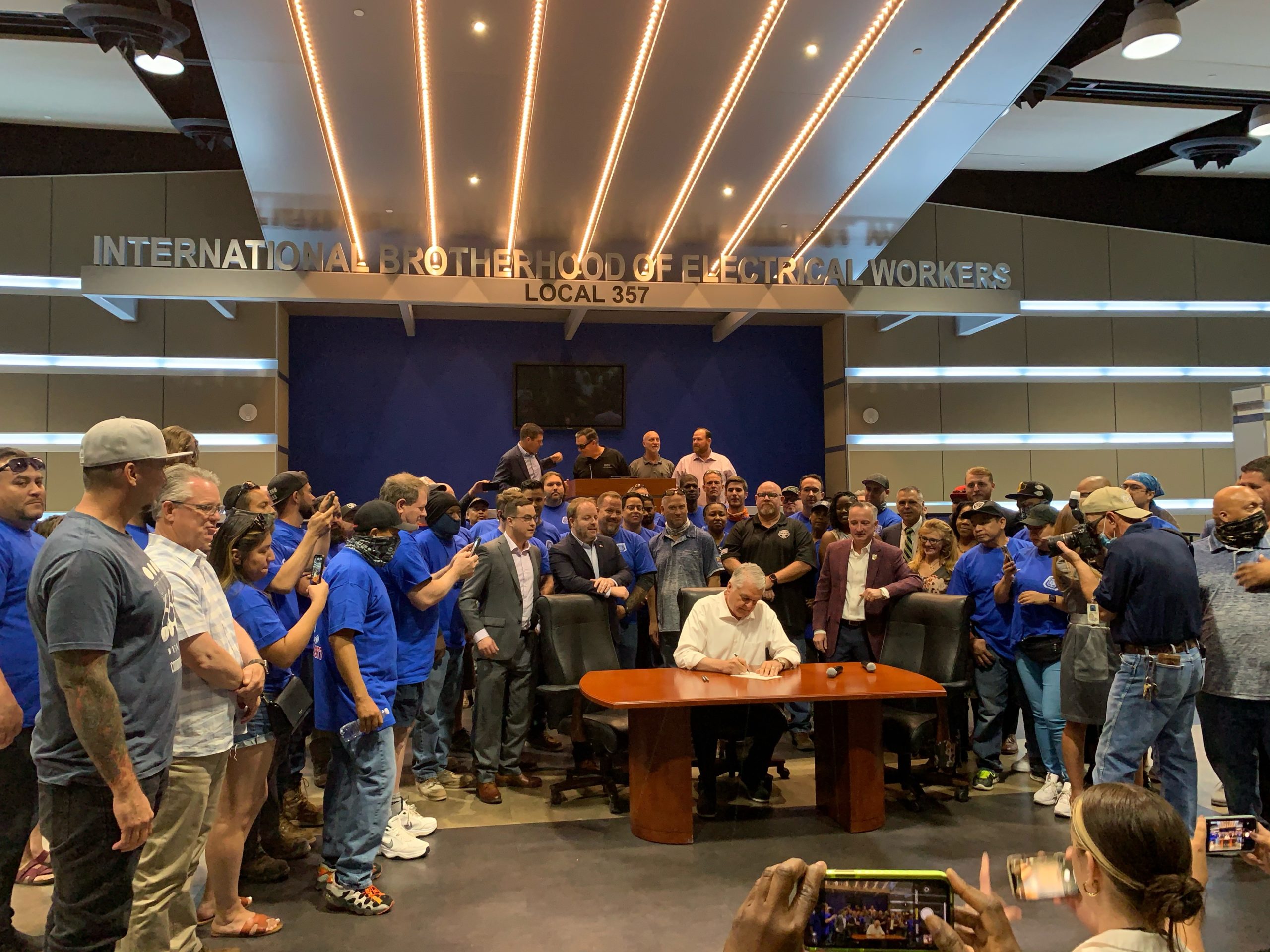June 10, 2021



FOR IMMEDIATE RELEASE
Contact:
Julianne Basinger, Western Resource Advocates, julianne.basinger@westernresources.org, 801-406-8664
Nadia Perl, NRDC, nperl@nrdc.org, 415-294-1878
Las Vegas, Nevada (June 10, 2021) — Nevada Governor Steve Sisolak signed Senate Bill 448 at the IBEW Local 357 hall today. This expansive bill will align electric utility plans and investments with state climate goals by addressing key issues in energy transmission, electric transportation, rooftop solar, clean electricity, renewable energy storage, energy efficiency, and more.
“Recovery from the COVID 19 pandemic has been much too slow for Nevada’s working families,” said IBEW Local 357 Business Manager James Halsey, IBEW Local 396 Business Manager Jesse Newman, IBEW Local 401 Business Manager Jacob Haas, and IBEW Local 1245 Business Manager Bob Dean. “Now is the time for Nevada to incentivize and approve infrastructure projects like electric vehicle charging infrastructure build-outs that will put our members back to work and infuse the economy with hundreds of millions of dollars-worth of investment and economic activity while simultaneously helping the state meet its renewable energy and carbon reduction goals. We thank Governor Sisolak, Senator Brooks, and legislative leadership Senators Cannizzaro and Settelmeyer, Speaker Frierson, and Leader Titus for collaborating on this important legislation to create good jobs.”
“With Governor Sisolak’s signature today, Nevada can move forward in carrying out the provisions in Senate Bill 448 that will help our state reach its climate goals,” said Cameron Dyer, Western Resource Advocates’ staff attorney in Nevada. “This bold legislation will help create the regional planning and transmission expansion to maximize our use of renewable electricity resources and will help build out our electric transportation infrastructure, with important investment in low-income communities. We are pleased the state is taking these significant steps to accelerate the transition to clean energy and reduce the harmful fossil-fuel emissions that cause climate change.”
“Senate Bill 448’s passage will reduce emissions, eliminate wasteful energy use, and make electric vehicles more accessible to low- and middle-income Nevadans,” said Ellen Zuckerman, Utility Program Co-Director for the Southwest Energy Efficiency Project. “At a time when far too many Nevadans are making painful economic decisions and falling behind on their electricity bills, it’s essential that we offer them new and improved opportunities to save energy. Thankfully, this bill does just that.”
“This bill provides opportunities for Nevadans to plug clean vehicles into clean electricity,” said Max Baumhefner, Senior Attorney at NRDC (Natural Resources Defense Council). “Gas- and diesel-powered cars and trucks are the largest source of local air pollution in Nevada, a problem which is especially intense for low-income communities near highways and other busy roads. By prioritizing these areas of the state for new electric vehicle infrastructure investments, we clean the air in communities that have borne a disproportionate share of pollution for far too long.”
Key elements of Senate Bill 448 include:
- Supporting regional electric grid planning to ensure that Nevada and neighboring states can provide reliable, affordable, clean electricity to their residents in the years to come;
- Strengthening Nevada’s transmission infrastructure through smart planning to ensure reliability and resiliency as well as access to expanded renewable generation of all types;
- Accelerating the transition to electric vehicles through a $100 million investment from NV Energy to invest in new electric vehicle charging stations and electric buses, with at least 40% of this infrastructure located in historically underserved communities;
- Increasing opportunities for rooftop solar in commercial and apartment buildings by clarifying existing laws and programs;
- Aligning the utility planning process with state climate goals by requiring utilities to forecast how they could achieve an 80% reduction in their carbon dioxide emissions from 2005 levels by the year 2030;
- Expanding the successful Renewable Energy Tax Abatement program to include renewable energy storage facilities in addition to the renewable energy generation facilities that are currently covered; and
- Doubling funding for energy efficiency programs that serve low-income customers and public schools in historically underserved communities.


